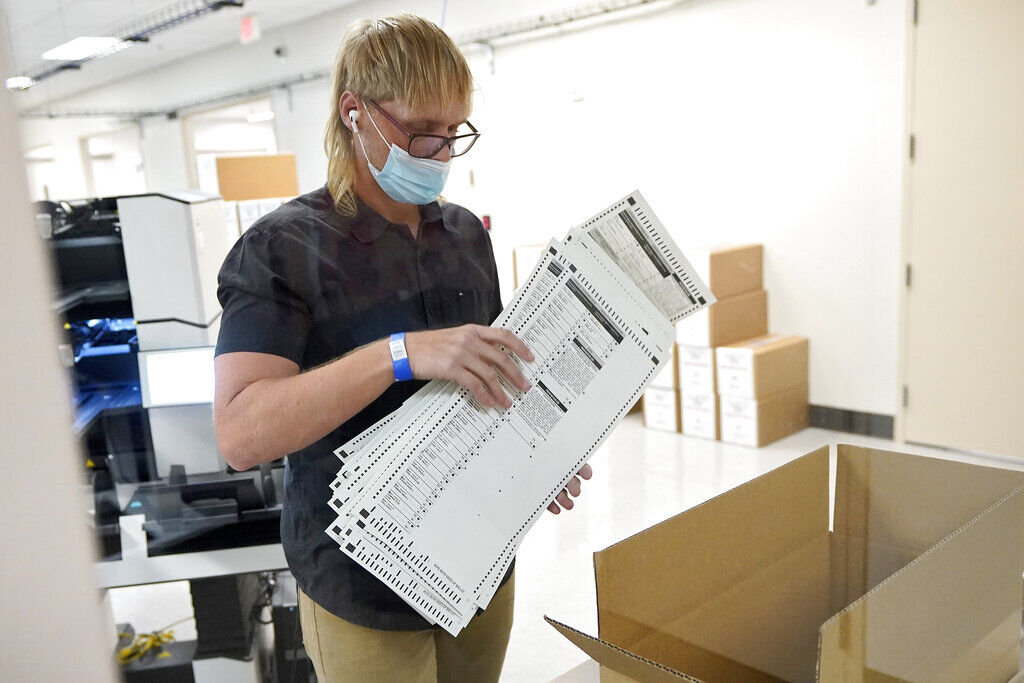Arizona counties are prohibited by law from hand-counting all ballots in an election, even if they want to do so because county leaders bought into conspiracy theories that vote tabulation machines are untrustworthy, the state Court of Appeals ruled.
Wednesday’s decision by the three-judge panel comes in an appeal bought by the two Republicans who control the Cochise County Board of Supervisors of a ruling issued by a local judge after the 2022 election. Cochise County tried to hand-count all early and Election Day ballots after the results were machine tabulated.
The Arizona Association of Retired Americans, a retiree group with ties to the Democratic Party, sued. The local judge ruled the expanded count wasn’t allowed and barred the county from doing it.
The ruling over what happened in 2022 sets an important precedent.
“The county has indicated that it intends to conduct ‘full’ hand-count audits in future elections,’’ wrote appellate court Judge Michael F. Kelly. He said that’s why the court agreed to hear the appeal to address the issue.
It’s not just about Cochise County.
Republican lawmakers have been making the rounds of the states’ other counties — at least those overseen by GOP majorities on their boards of supervisors — urging them to expand the hand-counts done after elections to ensure machine counts are accurate.
Arizona Senate Majority Leader Sonny Borrelli, R-Lake Havasu City, has been telling boards that a resolution adopted by the Republican-controlled Legislature earlier this year gives them that authority. But the resolution, which passed without Democratic support — and never was sent to Gov. Katie Hobbs — is not law.
The new court ruling lays out what the law is. And it does not allow counties to expand those hand-count audits, Kelly wrote.
He noted that the state constitution gives the Legislature authority to write election rules. And in this case the Legislature laid out a detailed process for small samples of early and Election Day ballots to be hand-counted to confirm the machine tallies.
“Because the legislature provided for a detailed method to verify the results from electronically tabulated voting machines, counties must follow that method unless and until the Legislature determines otherwise,’’ Kelly wrote. “Accordingly, the county did not have independent authority to conduct a hand-count audit of all precinct or early ballots in the first instance for the 2022 election.’’
Attorneys for Cochise County had argued before the appeals court in July that they have the legal option of expanding the hand count to include all ballots and not just the small samples laid out in the law and the Election Procedures Manual, a document created by the secretary of state to lay out more detailed election rules.
Lawyer Bryan Blehm, representing the county, said the board is required to certify the election. Because that law gives the board “broad authority and discretion’’ to oversee elections, it can expand the count to satisfy themselves of the machine-count result, he said.
But Kelly and the other two judges flatly rejected that, saying the Legislature wrote laws laying out specific rules on the size and scope of hand-counts and thus took away any discretion supervisors might have.
The law “establishes detailed procedures for conducting hand audits of electronically tabulated ballots,’’ Kelly wrote. “Because there is not an absence of statutory guidance here, but rather a detailed legislative scheme, neither (the law nor previous case decisions) supports the county’s position.’’
Blehm had also pointed to a provision of the procedures manual that gives counties discretion to expand hand-counts of early ballots, which make up more than 80% of the votes cast in Arizona elections.
But the Court of Appeals shot that down as well, saying that while the manual may give that discretion, the actual law does not, and it trumps the manual.
There is a provision in state law for a full hand count. But Kelly said these can occur only when a random hand count of a small percentage of ballots turns up an unacceptable level of error. That leads to a larger sample.
If subsequent counts of batches find disparities with the machine count, Kelly said, counties are permitted to do a full hand count. But only then.
“Interpreting (the law) to allow a county to begin with a full hand-count audit of all precincts would render the statute’s multi-step process superfluous,’’ and that is not acceptable, the judge wrote.
Peggy Judd, one of the Republican Cochise County supervisors who pursued the appeal, did not immediately return a call seeking comment.
Doubts about machine counts were first stoked by former President Donald Trump, who lost his 2020 reelection bid.
They also were embraced by many Republicans, including those leading Cochise County, Borrelli and others. But there is no evidence of any issues with machine counts, and extensive testing and pre- and post-election checks confirm their accuracy.
The ruling comes just days after the 9th Circuit Court of Appeals tossed a lawsuit challenging the use of voting machines brought by losing 2022 candidates Kari Lake and Mark Finchem.
In that ruling, the federal judges detailed the safeguards they say are designed to ensure the accuracy of machine-tallied votes. And they dismissed a scenario of how tallies could be manipulated as “speculation.’’
Get your morning recap of today's local news and read the full stories here: tucne.ws/morning





